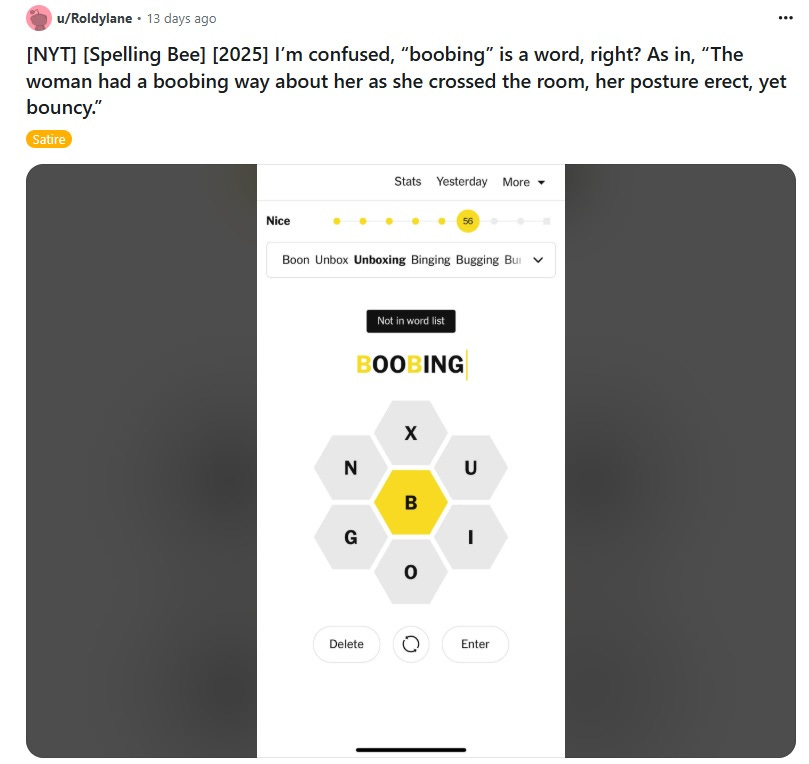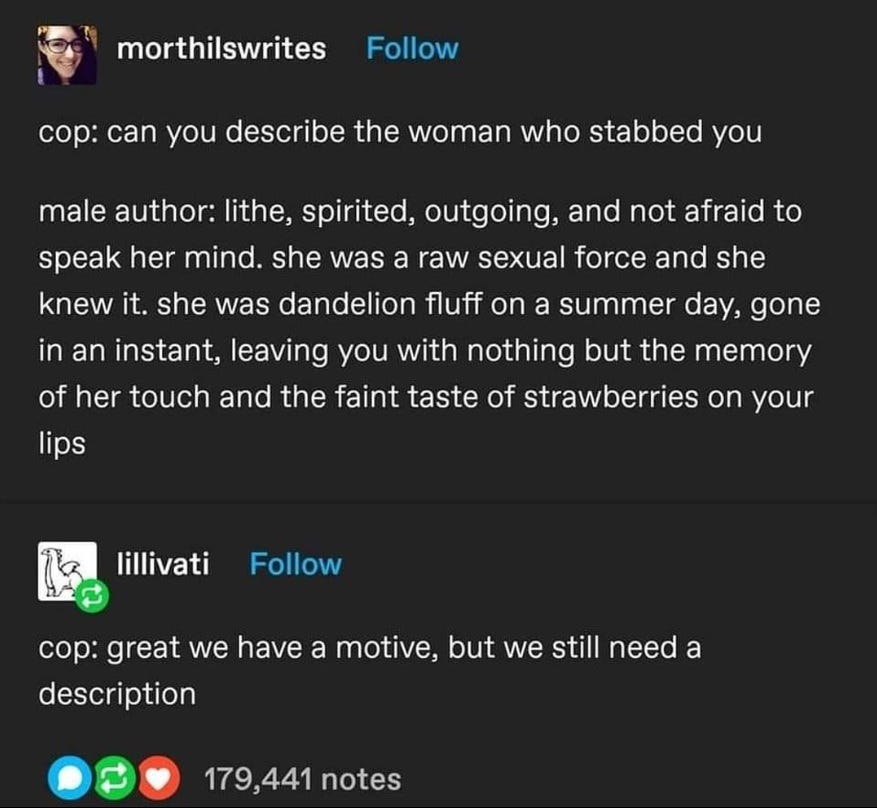Men writing women. This has been on my mind of late.
I am not a man, but I write men.1 Tod Goldberg (a man) once told me I’m good at it. “Well, I knew a guy,” I said.
It strikes me that, as a woman, I’ve been immersed in a man’s world all of my life—“This is a man’s, man’s, man’s world,” as the song goes.2 But perhaps the contrary is not true for a man. Men often lament that they can’t understand women, but it sort of makes sense. Historically, men have not been immersed in the lives and literature of women.3
I read books written by men, and there was a time when women didn’t have much choice if they wanted to read books at all. But studies have shown that men are reluctant to read women. “Why does this matter?” M.A. Sieghart wrote for The Guardian. “For a start, it narrows men’s experiences of the world. … If men don’t read books by and about women, they will fail to understand our psyches and our lived experience. They will continue to see the world through an almost entirely male lens, with the male experience as the default.”4
Men who are writing women, carry on. We need more women characters, just like we need more diverse characters, in all the books. And we need more men reading books by women authors—isn’t it weird that a book about a woman’s lived experience is “women’s literature” but a book about a man’s lived experience is just “literature”? Don’t you agree this is not okay?
So, men, please take all this into consideration if you are going to write women—and I hope you will write women. Immerse yourselves in books written by women. Immerse yourselves in the lives and experiences of women. Immerse yourselves in the culture of women. This is a worthwhile mission if you want to write women. And it’s your job.
Godspeed with doing your job.
XOXO
Leanne
P.S. I’ve included a few links below on men writing women, to help you on your journey. They were hard-won because most of the articles I found on the topic weren’t very good. From one: “Most women are motivated by two things: safety and service.” In other words, we need men to protect us, and we want to do their laundry. In my experience (as a woman), women are people—we are motivated by all the same things men are motivated by. At the same time, try to avoid writing a woman who is basically a man with a dress on.
“Pay attention to what you’re reading and who you’re reading. You have to make sure your bookshelf isn’t made up of just men. Add in some spice—some female authors, some nonbinary authors, or authors of color. And lastly, just because you were assigned a book in high school doesn’t mean it’s good!”
—Meghan Vondriska, founder of @MenWriteWomen, in an interview
NEWS & ANNOUNCEMENTS
My dear friend Wendy Burbridge recently launched her Substack, Reinvention Made Real. I’ve watched Wendy put all the things she’s learned into practice during the 25 years we’ve been friends—she’s successfully reinvented herself more than once! If you’re looking to create the life you’ve always dreamed of for yourself, she’s your person.
LAST CHANCE! LAST CHANCE! LAST CHANCE!
The Golden Quill Writing Contest is open now through June 30th for entries in the categories of fiction, nonfiction, and poetry. This year’s judges are Juliet McDaniel, whose debut novel Mr. and Mrs. American Pie is the book upon which the hit Apple TV+ series Palm Royale is based; Deanne Stillman, author of many nonfiction books, including Twentynine Palms: A True Story of Murder, Marines, and the Mojave; and SLO County Poet Laureate Caleb Nichols, author of Teems///\Recedes.
“I approach writing female characters the same way I approach writing male characters. I never think I’m writing about women, I think I’m writing about one woman, one person. And I try to imagine what she is like ….”
—Jeffrey Eugenides
Editor’s Note: Eugenides is widely acknowledged to write women well, but see the link to The Atlantic article below: “What Jeffrey Eugenides Doesn’t Understand About Women.”
SOME THINGS FOR READERS
Simple Instructions
(fiction by Sam Simas for the New England Review)
9 Books About Invisible Disabilities
(Marisa Wright for Electric Literature)
Backyard Bird Diary
(Amy Tan for The Paris Review)
It’s Not Me, It’s You: An Argument for Shorter Middle-Grade Books
(Melissa Taylor for Publisher’s Weekly)
“When men write women, they tend to write women the way they want women to be, or the way they resent women for being. They don’t really—they seldom nail it.”
—Simon Pegg, actor, screenwriter, and comedian
SOME THINGS FOR WRITERS
Pro tip #1: when you’re researching how to write women, look for articles in respected sources, articles written by women, and articles written by men who have established themselves as particularly good writers of women characters themselves.
Pro tip #2: there are lots of funny-not-funny compilations and a popular reddit (r/menwritingwomen) featuring bad and often humorous examples of men writing women—you can learn from these bad examples too. #whatnottodo
Writing Women: What Male Writers Should Keep in Mind When Creating Female Characters
(Rachael Cooper of Jericho Writers for The Novel Factory)
10 Big Mistakes to Avoid When Writing Female Characters
(author Lucy V. Hay for Bang2Write)
Writing Women Characters as Human Beings
(science fiction/fantasy author Kate Elliott for Reactor)
Dear male writers: here’s how not to write about breasts
(a compilation of quotes by author/editor Katherine May, compiled by Emily Temple for Literary Hub)
Tips for Men Writing Women
(Lynley Stace, a woman author of children’s books, for Slap Happy Larry)
Writing Female Characters: A Guide for Male Writers
(man author Nat Russo for A Writer’s Journey at Erindor Press)
What Jeffrey Eugenides Doesn’t Understand About Women
(Eleanor Barkhorn for The Atlantic)
Note: Barkhorn writes that Eugenides, author of The Virgin Suicides, Middlesex, and The Marriage Plot, “knows how to write women,” but that his attempt to defy traditional expectations that a novel must end in a marriage falls short in that it doesn’t give the woman protagonist true friendships with other women. “The great irony, of course,” Barkhorn writes, “is that the old-fashioned, marriage-plot-bound books that Eugenides attempts to modernize in his novel [e.g., Jane Austen’s Sense and Sensibility and Charlotte Brontë’s Jane Eyre] actually do a better job of portraying female friendship than The Marriage Plot.”
“It is difficult to get men to pick up a female author.
Women will read men, but men won’t read women.”
—Lisa Gardner, New York Times bestselling novelist
SOME THINGS TO MAKE YOU LAUGH

“It is a sad paradox that when male authors impersonate women … they are said to be dealing with ‘cosmic, major concerns’—but when we impersonate ourselves we are said to be writing ‘women’s fiction’ or ‘women’s poetry’.”
—Erica Jong, novelist and poet
Leanne Phillips
Writer | Book Coach | Editor
leannephillips.com
Thanks for reading my newsletter! If you liked it, please share it with a friend who might enjoy it. If you didn’t enjoy the newsletter, you can unsubscribe below.
For purposes of this post, I’m talking about men writing women, and women writing men. But there are also gay men and women, nonbinary people, and trans men and women to consider. That goes beyond the small scope of this post, but the same rules about putting in the extra work apply.
“It’s a Man’s, Man’s, Man’s World,” written by James Brown and Betty Jean Newsome, is a single from James Brown’s album of the same name, released in April 1966. (Stats are from Wikipedia.) Rolling Stone magazine called the lyrics “biblically chauvanistic” but wrote that Brown’s rendering made them sound “genuinely humane.” (500 Greatest Songs of All Time, 124: James Brown, ‘It’s a Man’s Man’s Man’s World’.)
This is a generalization, of course. #NotAllMen
M.A. Sieghart, “Why do so few men read books by women?” The Guardian, 7/09/2021, https://www.theguardian.com/books/2021/jul/09/why-do-so-few-men-read-books-by-women





Great title for this piece, Leanne, and this is always an interesting discussion. I reviewed Jay McInerney's novel Story of My Life years ago for the LAT. "Are men running out of things to say?," I wrote. "Or are they finally getting in touch with the side of the brain where sensitivity and mascara are housed? The answers to both questions may be yes, judging from the fact that some of our best male writers have recently paraded down the publishing runway in crinolines. First came John Updike as S., then Reynolds Price as Kate Vaiden, then Jim Harrison as Dalva. Now comes and equally effective though younger male voice..." Here's the rest: https://www.latimes.com/archives/la-xpm-1988-08-28-bk-1599-story.html